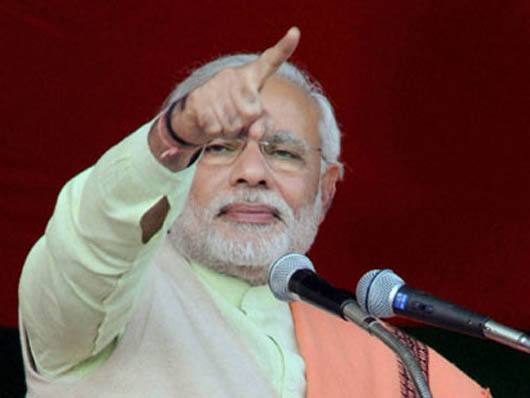Munger, Oct 8: Wading into the beef controversy, Prime Minister Narendra Modi today attacked RJD supremo Lalu Prasad over his 'Hindus also eat beef remark', saying he has insulted people of Bihar and particularly his community "Yaduvanshis" who had brought him to power.

Addressing a poll rally here, Modi, who has been silent on the lynching of a man in Dadri over rumours of eating beef despite widespread outrage and the debate over beef ban, latched on to Lalu's remarks on beef and said a "shaitan (devil) has entered a human body".
"What all did he eat? It (the remarks) insulted the Yaduvanshis... Laluji these Yaduvanshis helped you to come to power. What all Yadavs eat...is it not an insult of Yadavs and Bihar?" he said.
Modi, who is under attack from the grand alliance for allegedly insulting people of Bihar through his DNA barb against Nitish Kumar, repeatedly sought to project Lalu's beef remarks as an insult not only to the entire Yadav community whose primary occupation has been rearing cows, but to the entire state.
Insisting that Lalu cannot absolve himself of his beef remarks by claiming that it was the "devil" (shaitan) on his tongue which made him say it, he said, "I want to know how the shaitan got the address (of Lalu)...he recognises that it was the shaitan in a similar manner as people recognise their relatives."
Ridiculing Lalu's remarks that it was the "devil under whose influence" he made the beef remarks, Modi said "so far we were fighting (political rivals) human beings. Now a shaitan has entered a human body which is after us.
Repeatedly referring to Lalu's remarks, the Prime Minister asked the gathering "do we have place for such people in Bihar?"
Amid a realisation that an intact Muslim-Yadav combination could lead to problems for it, BJP-led NDA is banking heavily on a division in Yadav votes and has prominently put Yadav leaders like Ram Kripal Yadav and Nand Kishore Yadav to counter the RJD chief's appeal in the community.
Modi also used the death anniversary of Jayaprakash Narayan today to attack Bihar Chief Minister Nitish Kumar and Lalu saying those who once sang paeans of the socialist leader have now joined hands with Congress which had sent JP behind bars during Emergency and dubbed the grand secular alliance as a "mahaswarth bandhan" (alliance of big opportunism).
Alleging that Congress is trying to make a "backdoor" entry into Bihar politics by aligning with JD (U) and RJD after having lost its own relevance, Modi questioned both Lalu and Nitish over their commitment to 'JP' who fought against Congress his entire life.
"Congress imposed Emergency and put JP behind bars where he fell ill and as a result passed away early. Standing by the same Congress, they are now abusing BJP," he said.
Under constant attack from grand alliance over RSS chief Mohan Bhagwat's demand for a review of reservation policy which the BJP had quickly rejected, Modi attempted to project Bihar election as a fight beyond caste issue and reached out to the youth.
"Political pundits will be forced to change their thinking in Bihar. For the first time it will be (fought) above caste considerations. It will be fought on the issue of youth and development. These will be the central issues now," he said.
Youth had voted in large number for BJP-led NDA in the last Lok Sabha polls leading to its spectacular victory even in Bihar where it had bagged 31 out of 40 Lok Sabha seats. There is a view that if the caste factor dominates in the election, it could help the grand alliance. BJP is, therefore, again reaching out to the youth, projecting Modi as a mascot of change.
Referring to noted Hindi poet Ramdhari Singh 'Dinkar', Modi said his words that 'singhasan khali karo, janata aati hai' (vacate power, the common man is coming) have been taken seriously by the youth of Bihar who want a change.
On the crime rate during the regime of Lalu Prasad, Modi said "kidnapping had become an industry. People refused to venture out after sunset even during festivals. Nobody bought a new vehicle fearing it would be snatched by goons.
"Figures of the Bihar government show that between January and July 4000 kidnappings have taken place," he said, apparently suggesting that after Nitish and Lalu joined hands, such incidents have risen.
"Do you want jungle raj or developmen. Bihar has youth and water as its main assets. But both have been exploited and not utilised for development. Give us a chance; come out in large numbers to vote. Ensure that no 'shaitan' returns... vote in large numbers," he said.
Referring to the Rs 1.65 lakh crore packages announced by the Centre for Bihar, he alleged that the state government is creating hindrance in its implementation. "But people won't allow this to happen as they want development not jungle raj," he said.





Comments
Add new comment